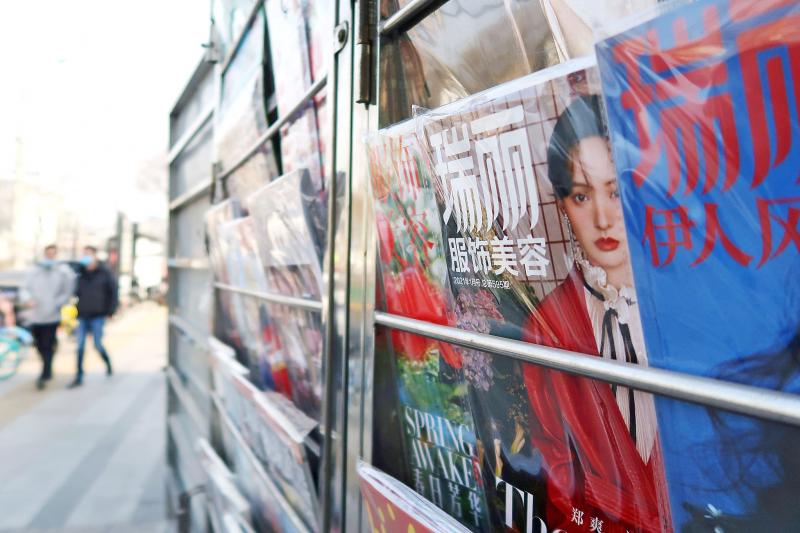The surrogacy scandal involving Chinese actress Zheng Shuang continues to snowball on social media, as her ex-boyfriend Zhang Heng exposed more evidence recently about her abandoning their two children born via surrogacy. The scandal erupted on Jan. 18, as Zhang released a conversation recorded after they split, in which Zheng cruelly suggested either aborting or abandoning the babies before they were born.
Under huge criticism, Italian luxury brand Prada quickly announced the next day its decision to cut all ties with the actress, just nine days after appointing her as an endorser. China’s National Radio and Television Administration followed shortly by declaring that it will “never give a chance for those who have committed scandals and misdeeds to show their faces.”
In addition, the controversy has now caused a debate over surrogacy. While surrogacy is illegal in China, those paying for such services overseas could not be charged under Chinese laws. However, Zheng’s abandonment of her children is subject to the jurisdiction of Chinese laws.

Photo: Reuters 照片:路透
(Eddy Chang, Taipei Times)
中國人氣女星鄭爽爆出代孕棄子醜聞,她的前男友張恒近日舉證她遺棄他們透過代孕生的兩名子女,讓新聞在社群網站上持續延燒。而這起醜聞在一月十八日爆發,當時張恒公布他們分手後的錄音對話,顯示鄭爽曾殘酷地說,要將尚未出生的兩名嬰兒流產或棄養。
在巨大批評聲浪之下,義大利精品普拉達於次日宣布,立即和鄭爽解除一切合作關係,該公司在此九天前才剛指定她為品牌代言人。中國的國家廣播電視總局隨後亦宣布封殺她,並痛批:「我們不會為醜聞劣跡者提供發聲露臉的機會和平台。」
這次爭議也引發對代孕的辯論,代孕生子在中國算是違法行為,在海外接受付費代孕服務則不受國內法規範。然而鄭爽惡意遺棄子女的部分,仍屬於中國法律的管轄範圍內。
(台北時報張聖恩)

A: In its latest annual travel guide, Bloomberg recommended two restaurants in Taipei: Golden Pig barbeque from South Korea and two-Michelin-star restaurant A. B: Also, tourists should definitely try Taiwanese cuisine while they’re here. Mountain & Sea House, Shin Yeh Taiwanese Cuisine, and Fujin Tree Taiwanese Cuisine & Champagne are good options. A: For local snacks, Fu Hang Soy Milk, Fu-Ba-Wang Pigs’ Knuckles Restaurant, and Wang Ji Rice Dumplings are all very popular. B: And the gold medalists of the 2025 Taipei International Beef Noodle Festival — Yun Shui Kitchen, The Howard Plaza Hotel Taipei, and Come N’ Eat

For many introverts, shy individuals and people with social anxiety, mingling at parties is often draining or arouses uncomfortable emotions. The internal debate about whether or not to attend large get-togethers can get especially intense during the holiday season, a time when many workplaces celebrate with cocktail hours, gift exchanges and other forms of organized fun. “Some people are just not party people,” City University of New York social work professor Laura MacLeod said. “With a workplace holiday party, there’s a pressure to be very happy and excited. It’s the end of the year, it’s the holidays, we’re all feeling grand.

Facing relentless flooding and rising expenses, Dumble Farm in England has stopped selling milk and started an unexpected but therapeutic venture: cow cuddles. In 2022, the owners sold most of their dairy cows and began letting visitors spend time brushing, petting, and even hugging specially trained Highland cows for 95 pounds per session. This unusual shift reflects the rise of the so-called healing economy, a sector where animal-assisted experiences are marketed as emotional remedies for stress and burnout. While dogs and cats remain the most common therapy animals, cows are gaining popularity for their calm nature. At Dumble Farm, only cows that

對話 Dialogue 清清:你看到小陳最近發的滑雪照了嗎?看起來真帥氣。 Qīngqing: Nǐ kàndào Xiǎo Chén zuìjìn fā de huáxuě zhào le ma? Kàn qǐlái zhēn shuàiqì. 華華:感覺滑雪很好玩。看了他的照片以後,我在想要不要去學滑雪。 Huáhua: Gǎnjué huáxuě hěn hǎowán. Kàn le tā de zhàopiàn yǐhòu, wǒ zài xiǎng yào bú yào qù xué huáxuě. 清清:我聽說報名滑雪教室的話,會有教練帶你練習。 Qīngqing: Wǒ tīngshuō bàomíng huáxuě jiàoshì de huà, huì yǒu jiàoliàn dài nǐ liànxí. 華華:可是我有點怕摔倒,而且裝備好像不便宜。 Huáhua: Kěshì wǒ yǒudiǎn pà shuāidǎo, érqiě huāngbèi hǎoxiàng bù piányí. 清清:剛開始一定會摔啊,不過可以先上初級課程,比較安全。 Qīngqing: Gāng kāishǐ yídìng huì shuāi a, búguò kěyǐ xiān shàng chūjí kèchéng, bǐjiào ānquán. 華華:說的也是。那你呢?你想不想一起去? Huáhua: Shuō de yěshì. Nà nǐ ne? Nǐ xiǎng bù xiǎng yìqǐ qù? 清清:我想加一!我們可以先找找看哪裡有教練和適合初學者的課程。 Qīngqing: Wǒ xiǎng jiā yī! Wǒmen kěyǐ xiān zhǎo zhǎo kàn nǎlǐ yǒu jiàoliàn hàn shìhé